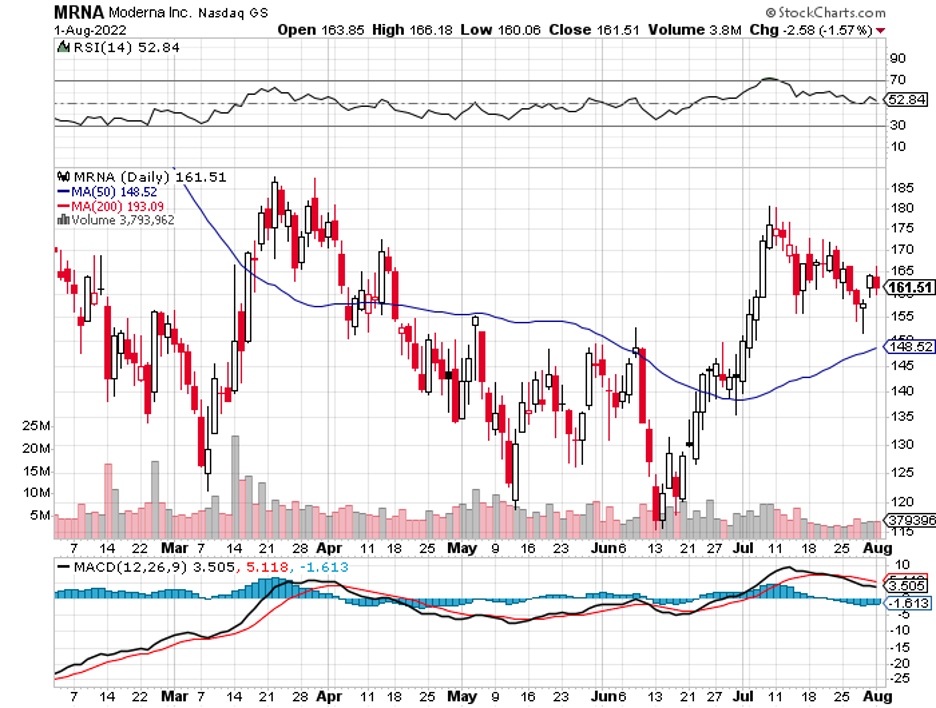A Rising Tide Lifts All Boats
Moderna (MRNA) shareholders have one major worry in recent months: that the biotech company’s billion-dollar COVID-19 vaccine sales will eventually dry up.
After all, roughly 67% of the US population has already been fully vaccinated. Hence, it’s not surprising for investors to wonder whether the company’s glory days are over.
As a result, Moderna’s share price has taken a hit. The stock has slipped by over 35% so far in 2022. However, this looks more like an overreaction rather than a response to anything the company has done.
If anything, it seems that investors have read the situation wrong since Moderna recently received a billion-dollar vaccine dollar from the US.
The deal isn’t for the original version of its COVID-19 vaccine though. Instead, it’s for an updated booster candidate that targets the original coronavirus and the emerging omicron BA.4 and BA.5 strains.
Moderna will receive $1.74 billion to supply the US with 66 million doses of the updated booster. This means the price per dose would be $26.36.
This pricing is lower than the deal with Pfizer (PFE) for a similar booster, which had an implied price per dose of $30.48. In total, Pfizer is set to receive $3.2 billion for 105 million doses.
Nevertheless, this new Moderna contract shows a substantially higher price compared to the previous deal wherein the US paid $3.3 billion for 200 million doses.
That particular deal implied that the price per dose of the vaccine was at $16.50. in comparison, Pfizer’s vaccine was priced at $24 per dose.
A probable explanation for this disparity in pricing is the fact that Moderna received approximately $1 billion in funding from the US government courtesy of its Operation Warp Speed program. Meanwhile, Pfizer refused to participate in such a scheme.
Taken together, Moderna and Pfizer are slated to deliver 171 million doses of the updated booster by fall and winter.
Admittedly, those won’t be sufficient to cover the entire US population. This is why both contracts have options that would allow the government to add 300 million doses each as needed.
In terms of delivery, Moderna announced that its candidate should be ready for the fall vaccination campaign by the end of August.
Outside its coronavirus vaccine efforts, Moderna has a promising pipeline of candidates. To date, the company has 46 programs under development including personalized cancer vaccines.
Of these, Moderna has three candidates queued for Phase 3 trials. All of them are investigational vaccines. One is for the flu, another is for the respiratory syncytial virus (RSV), and the third targets the cytomegalovirus (CMV).
The flu vaccine has competition in Sanofi (SNY) and possibly Novavax (NVAX). However, there are no CMV and RSV vaccine candidates in existence.
Needless to say, getting the green light from the FDA for one or both of these vaccine candidates would be a massive win for Moderna.
More importantly, the company would hold the precious first-to-market competitive edge.
Another exciting candidate is Moderna’s collaboration with Vertex Pharmaceuticals (VRTX). The two are working on an inhaled candidate treatment for patients with cystic fibrosis.
Considering that Vertex is practically a monopoly in this space, its partnership with Moderna could mean a potential game changer in the industry.
Overall, Moderna’s lucrative deal with the US government could be indicative of another exciting period for coronavirus vaccine stocks.
After all, a rising tide lifts all boats.
Moreover, this group had the best performers on the market in the past years. Novavax skyrocketed by 2,700% in 2020 following the announcement of its COVID-19 program. BioNTech (BNTX) jumped by 600%, while Moderna climbed by an impressive 1,200%. Even Pfizer reaped rewards from its coronavirus candidate as it rose by 59% during the same period.
While these vaccine stocks won’t likely repeat their stellar performances, there are still several investment opportunities involving these companies.
The key is to choose a business that does not simply depend on its coronavirus vaccine gains but also leverages the opportunities to expand and diversify its portfolio.
This is what Moderna has been doing. With numerous programs in its pipeline, the company has turned itself into a multi product business that offers stability and growth. Investors eager to add a vaccine stock in their portfolio should buy the dip.

